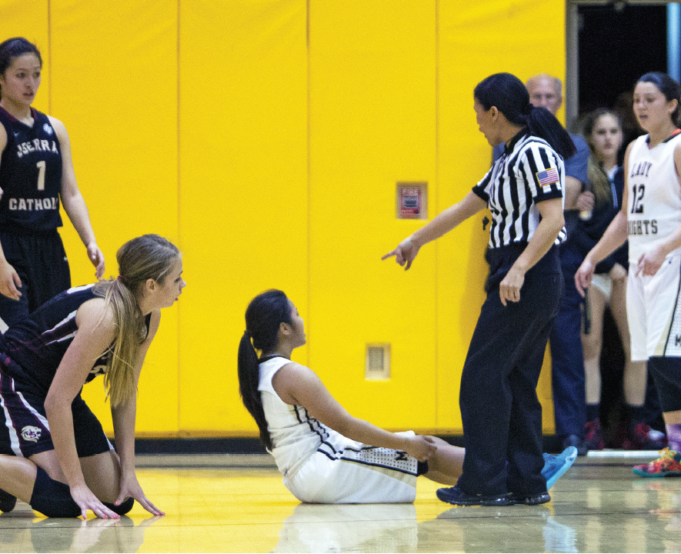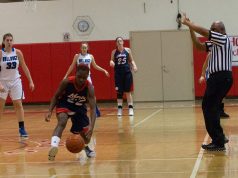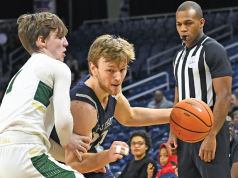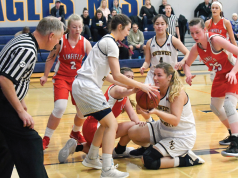From years of being around high-level Division I men’s college basketball officials, Ray Natili learned to train his eyes and “quit looking at the basketball.” It’s a mantra he now shares at camps he works at as an observer over the summer to help others improve their officiating skills by looking off the ball.
One spring, while observing at Curtis Shaw’s camp in Duncanville, Texas, Natili repeatedly urged campers to look off the ball for illegal activity. He coined the phrase, “Four eyes off the ball,” and credits officials like Shaw, Mike Wood and Karl Hess with helping him develop that skill. Now he is passing it down.
In a three-person crew, we “don’t need six eyes on the ball,” Natili said. “We need four off the ball. There’s a whole other world out there off the ball. You have three officials on the court, so only one-third of those eyes should be following the ball, the other two-thirds should be off.
“Every official has a primary area of coverage and for two of those it’s off the ball. At camps you need to work on these habits. It’s hard to do in-season. It’s like golf — if you want to hit a draw on the course, you have to spend time practicing it.”
During Shaw’s camp, Natili gave officials walking orders to practice: Get an off-the-ball foul every half. That meant they were actively looking at and enforcing coverage in their area. “I don’t care if the calls are marginal,” Natili observed. “It’s a camp. Get in the habit. When it’s December, then it’s part of what you do.”
As an experienced D-I official who has worked deep into the NCAA tournament, Natili is keenly aware of the importance of cleaning up excessive physicality in the college game. Setting a strong example of enforcement and passing down lessons to other officials is an important part of ensuring freedom of movement.
Starts with positioning.
“It’s critical to set up in the right position. Focus on your primary,” he said. From there, keep an eye on cutters and picks. “A vast majority of our calls are on the ball. Everybody in the building can call those.”
Beyond cutters and picks, Natili encouraged officials to watch the shooter as they try to free themselves up. The shooter may get bounced several times while weaving through defenders. That affects the timing of the offense and throws it out of sync. There is then less time on the shot clock to shoot, and the shooter “screws up because we let the excessive contact happen.”
Natili urged campers to focus on the action of knocking shooters off their routes as they weave to set up in an area. He termed that “chucking the cutters,” and said another area to watch and enforce is setting up in post play — being ready for when the ball is received in the post.
Another area is transition. “Rough play starts even as the players are coming down the court,” Natili said. “If three officials are watching over their shoulders in transition, then no one is looking at what’s happening as the players set up on the other end. Rough play starts there.
“Most of the time, it’s the offensive post player who initiates rough contact. He’ll use his rear end or hip to dislodge the defender; then we catch the wrong guy because we haven’t been looking where we should be looking,” he added.
After more than 30 years in D-I men’s basketball, Bryan Kersey has seen his share of “head jerk” whistles, when a partner makes a call on the ball when the official should be looking elsewhere. The primary official on that play jerks his or her head to see why the call was made because the primary official has passed on the ruling.
“Those types of plays — where they’re right in front of you but the whistle comes from your partner across the court — cause problems,” Kersey said. “The coach wants to know why you (as the primary) didn’t make the call because you’re standing right there.
“Before our team goes onto the floor, we discuss making sure all the whistles are coming from the right spots. That ensures a smoother game. If it’s in your primary, you can explain it.”
For younger officials in particular, Kersey advised, “Don’t be a hero and blow your whistle in front of others unless you are 100 percent certain.” Officiating the closest match-up also helps the game go smoother. “Whether you are in the trail, lead or slot, referee the nearest match-up. It’s the easiest thing to look at,” he said.
Kersey encourages his crewmates to anticipate those situations so they are prepared: “Pick those match-ups that are coming toward you so you have whistles in the right areas, and not as the play is moving away from you.”
Same in women’s game.
Division I women’s officials Shannon Feck and Brian Hall agreed that the concept is the same for the women’s game despite court coverage differences. “It’s an important concept, and officials don’t always get it,” Hall said. “In the heat of the moment, it requires discipline to make the call off the ball.”
Hall said he employs self-talk to help him with discipline to keep his eyes off the ball. He’ll call out to himself the players he is responsible for at the exact moment in time and concentrate on them, using the players’ jersey numbers to focus his concentration. How long he will stay with the action in his area “depends on how competitive the match-up is. If one player is on top of another, I’ll stay with it.”
“Know your primaries. If you’re not responsible for action on the ball, you’re off ball. Know what you need to do in each position — lead, trail and center,” he said.
During his pregame, particularly with a less experienced or unfamiliar crews, Hall said he will go over “areas of intersection” on the court, where there can be coverage confusion. That often occurs during transition in the game from offense to defense as the official moves from on-ball to off-ball coverage. “We need two sets of eyes on those intersection (of coverage) plays, for a split second,” Hall explained.
What separates the top officials is their enforcement of off-ball action, according to Hall. “The on-ball stuff is more apparent,” he said. “Know your responsibilities and when you don’t need to be covering the ball.”
Hall compared watching off ball to watching the defender. If you watch the defender, you will be able to see illegal activity by the offensive player as well as the defensive player. The key is to know “why” the action occurred, and that means paying attention to activity within your area of responsibility.
“We teach campers to look off-ball during the summer,” Hall said. “A light bulb goes (on) when you see them get plays right and they’re no longer guessing.”
Feck called “four eyes off the ball” a “universal concept,” applicable to both the women’s and men’s games. On the women’s side, she said there are clear primary areas designated for the crew to officiate.
Off-ball coverage is about being disciplined and strongly officiating competitive match-ups in your primary, not just the “area” itself, Feck said. “If there is not a competitive match-up in your primary, extend to your secondary and find the next competitive match-up that you can actively officiate. Off-ball coverage is about finding competitive matchups in your primary and being ready to come with a whistle in situations where your partners have a closed look,” she said.
Ask yourself, “What is going to hurt me next?” Typical things to look for off-ball include screens (backside, at the elbow, crossing along the endline, etc.), cutters, rough post play and displacement during rebounding, Feck said.
“Enforce freedom of movement by asking yourself if a player’s RSBQ (rhythm, speed, balance, quickness) is affected,” she said. “That can help you determine whether you need to blow your whistle or not.”
Feck, too, emphasized addressing off-the-ball coverage in the pregame, and using self-talk for focus: “I’m always looking for my next matchup, and what type of play could hurt me next,” she said. “Focus on your primary. Help in your secondary. If you referee your primary really hard, you’ll have a really good game.”
Trust your partner.
Four eyes off the ball means trusting your partner. “You have to trust your partner to clean up his area. If your partner has the dribbler, he shouldn’t need your help,” Natili emphasized.
During the pregame, Natili said he discusses the need to clean up illegal contact early, and the game will go “1,000 percent better. The rule changes emphasize cleaning up the illegal contact to increase freedom of movement. It’s an integral part of what the rules committee wants us to do. We need to do our part as officials, and teach this in camp situations.
“Coaches will coach what you allow them to do, use that to their advantage and exploit it so extra physicality remains,” Natili said. “We, as officials, must be committed to cleaning up illegal contact from opening night in December, all the way through the national championship game in April. For real change to occur in our game, it’s incumbent on the high-level guys to referee by example so it trickles down to D-II, D-III and high school.”
What's Your Call? Leave a Comment:
Note: This article is archival in nature. Rules, interpretations, mechanics, philosophies and other information may or may not be correct for the current year.
This article is the copyright of ©Referee Enterprises, Inc., and may not be republished in whole or in part online, in print or in any capacity without expressed written permission from Referee. The article is made available for educational use by individuals.



















